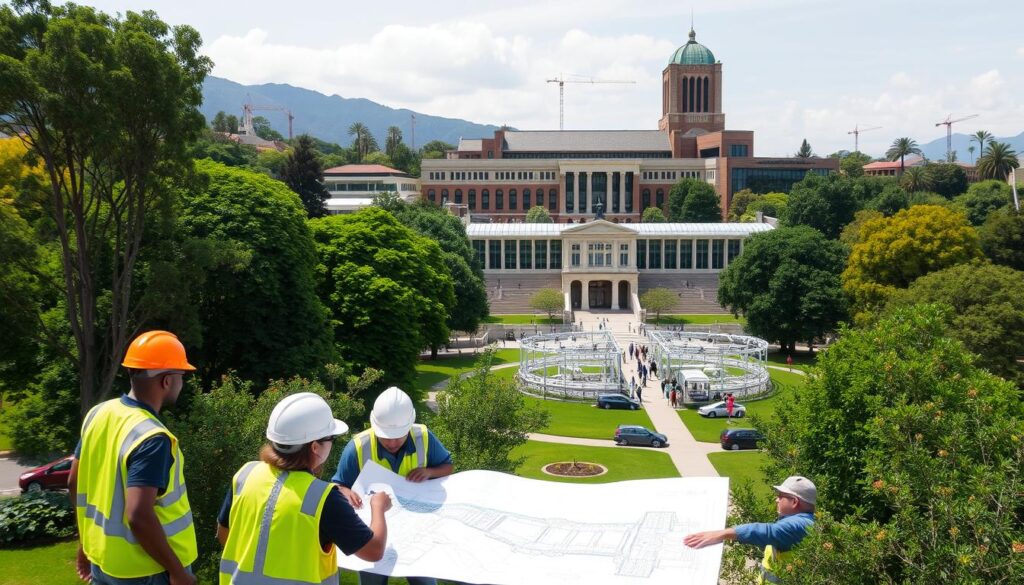Are you aspiring to become a leading civil engineer but unsure about the top institutions to pursue your dreams in Africa?
Civil engineering is a vital profession that shapes the infrastructure of our world. With the growing need for skilled engineers, choosing the right university is crucial. Africa is home to many prestigious institutions offering high-quality civil engineering programs.
The continent is witnessing rapid development, and the demand for skilled civil engineers is on the rise. In this article, we will explore some of the leading universities in Africa that offer exceptional civil engineering programs.
Key Takeaways
- Overview of civil engineering education in Africa
- Importance of selecting the right university
- List of top African universities for civil engineering
- Key factors to consider when choosing a university
- Career prospects for civil engineers in Africa
Importance of Civil Engineering Education
As Africa continues to grow, the demand for skilled civil engineers has never been more critical, highlighting the significance of quality civil engineering education. The continent’s infrastructure development is heavily reliant on the expertise of civil engineers who can design, build, and maintain complex infrastructure projects.
Civil engineering education plays a vital role in equipping students with the necessary skills and knowledge to succeed in this field. The programs offered in top African universities are designed to provide a comprehensive understanding of civil engineering principles, as well as practical experience through internships and project-based learning.
Key Skills Developed in Civil Engineering
Civil engineering programs focus on developing a range of skills that are essential for a successful career in the field. Some of the key skills include:
- Design and Analysis Skills: Civil engineers learn to design and analyze infrastructure projects, taking into account factors such as sustainability, safety, and cost-effectiveness.
- Problem-Solving Skills: Through project-based learning, students develop problem-solving skills, learning to tackle complex engineering challenges.
- Collaboration and Communication Skills: Civil engineering programs emphasize the importance of teamwork and effective communication, preparing students to work collaboratively with stakeholders.
Career Opportunities for Civil Engineers
Civil engineers are in high demand, with a wide range of career opportunities available across various sectors. Some of the potential career paths include:
- Infrastructure Development: Civil engineers can work on designing and building infrastructure projects such as roads, bridges, and buildings.
- Consulting and Advisory Roles: Experienced civil engineers can take on consulting and advisory roles, providing expert advice to government agencies, private companies, and other organizations.
- Research and Academia: Civil engineers can also pursue careers in research and academia, contributing to the development of new technologies and teaching the next generation of engineers.
By pursuing a civil engineering education, individuals can unlock a world of career opportunities and make a meaningful contribution to Africa’s development.
Overview of Civil Engineering in Africa
The landscape of civil engineering in Africa is evolving, with a growing emphasis on sustainable practices and innovative solutions. As the continent continues to develop, the demand for skilled civil engineers who can design, build, and maintain infrastructure is on the rise.

Civil engineering plays a crucial role in Africa’s development, encompassing the construction of roads, bridges, buildings, and water treatment facilities. The field is not just about construction; it’s also about creating sustainable and resilient infrastructure that can withstand the challenges posed by climate change.
Current Trends in Civil Engineering
One of the significant trends in civil engineering in Africa is the adoption of green building practices. There’s a growing awareness of the need to reduce the environmental impact of construction projects. This includes using locally sourced materials, minimizing waste, and incorporating energy-efficient designs.
“Sustainability is no longer a choice but a necessity in modern civil engineering.” This shift towards sustainability is driven by both environmental concerns and the need to create cost-effective solutions.
Challenges Facing the Industry
Despite the progress, the civil engineering sector in Africa faces several challenges. Infrastructure development is often hampered by inadequate funding, bureaucratic processes, and a shortage of skilled professionals. Moreover, the industry must contend with the impacts of climate change, which requires innovative and adaptive solutions.
“The biggest challenge is not just building infrastructure, but building it in a way that is sustainable and can adapt to the changing climate.”
The industry is responding to these challenges through various initiatives, including investment in education and training, adoption of new technologies, and collaboration between governments, private sector entities, and international organizations.
As the field continues to evolve, it’s clear that civil engineering will play a pivotal role in shaping Africa’s future. The top universities for civil engineering studies in Africa are at the forefront of this change, providing the education and training needed to tackle the continent’s infrastructure challenges.
Criteria for Evaluating Universities
Evaluating universities for civil engineering programs involves a multifaceted approach, considering factors such as accreditation and research facilities. When assessing the best colleges for a civil engineering degree in Africa, it’s essential to look beyond rankings and consider what makes an institution stand out in terms of quality education and research opportunities.
Accreditation and Recognition
Accreditation is a critical factor in determining the credibility and quality of a civil engineering program. Universities that are accredited by recognized accrediting agencies ensure that their programs meet specific standards. For instance, in South Africa, the Engineering Council of South Africa (ECSA) is a key accrediting body. Accreditation not only ensures that the curriculum is relevant and up-to-date but also that graduates are eligible for professional registration, a crucial step for a successful engineering career.
Key Accrediting Bodies in Africa:
- Engineering Council of South Africa (ECSA)
- Nigerian Society of Engineers (NSE)
- Kenya Engineers Board (KEB)
Research Opportunities and Facilities
Research opportunities and state-of-the-art facilities are vital components of a robust civil engineering program. They provide students with hands-on experience and exposure to cutting-edge technology, enhancing their learning experience and preparing them for the challenges of the engineering profession.
Universities with strong research focus areas tend to attract top talent and funding, creating a vibrant academic environment. For example, the University of Cape Town has research centers dedicated to various aspects of civil engineering, including structural engineering and water resources management.
| University | Research Focus Areas | Notable Facilities |
|---|---|---|
| University of Cape Town | Structural Engineering, Water Resources | State-of-the-art laboratories, Research centers |
| Stellenbosch University | Transportation Engineering, Geotechnical Engineering | Advanced geotechnical centrifuge, Transportation research facility |
“The quality of a university is measured not just by its facilities, but by the opportunities it provides for research and innovation.”
By focusing on accreditation, recognition, research opportunities, and facilities, prospective students can make informed decisions about the best colleges for a civil engineering degree in Africa.
University of Cape Town: A Leading Institution
The University of Cape Town stands out as a premier destination for civil engineering education in Africa. With a strong commitment to academic excellence and innovative research, it has established itself as one of the best universities for civil engineering in Africa.
![]()
Program Highlights
The University of Cape Town’s civil engineering program is designed to equip students with a comprehensive understanding of the field, including structural analysis, transportation engineering, and water resources management. The curriculum is rigorously structured to ensure that graduates are well-prepared to tackle the challenges of the civil engineering profession.
As noted by the university, “Our curriculum is designed to provide a balance between theoretical knowledge and practical application, ensuring that our graduates are highly sought after by employers.” This approach is reflected in the
“The Department of Civil Engineering at UCT is recognized for its research output and has a strong reputation for producing high-quality graduates.”
Faculty Expertise
The faculty at the University of Cape Town’s civil engineering department comprises experienced professionals with a deep understanding of their respective fields. Their expertise spans a wide range of areas, including geotechnical engineering, environmental engineering, and construction management.
- Professors with international recognition for their research contributions
- Industry experts who bring real-world experience into the classroom
- Researchers who are pushing the boundaries of civil engineering knowledge
Research Innovations
The University of Cape Town is at the forefront of civil engineering research, with a focus on addressing the complex challenges facing the industry. From developing sustainable infrastructure solutions to improving transportation systems, the university’s research is making a tangible impact.
One notable example is the university’s research into advanced materials for infrastructure development, which has the potential to revolutionize the construction industry. As the university’s research output continues to grow, it solidifies its position as a leader in civil engineering education and research in Africa.
Stellenbosch University: A Premier Choice
Among the top civil engineering schools in Africa, Stellenbosch University distinguishes itself through its comprehensive programs. The university’s civil engineering department is recognized for its academic excellence and innovative research.
Curriculum Overview
The civil engineering program at Stellenbosch University is designed to provide students with a solid foundation in engineering principles, as well as the skills to apply these principles in real-world contexts. The curriculum covers a wide range of topics, including structural engineering, transportation engineering, water resources engineering, and geotechnical engineering.
Key Courses:
- Introduction to Civil Engineering
- Structural Analysis and Design
- Transportation Engineering
- Water Resources Engineering
- Geotechnical Engineering
Campus Facilities
Stellenbosch University’s campus is equipped with state-of-the-art facilities that support both theoretical learning and practical application. The civil engineering department has modern laboratories and equipment, enabling students to engage in hands-on learning and research projects.
Notable Facilities:
- Advanced structural testing laboratory
- Transportation engineering laboratory
- Water resources laboratory
Student Support Services
Stellenbosch University is committed to providing comprehensive support services to its students. The university offers academic advising, mental health services, and career counseling, ensuring that students have the resources they need to succeed.
| Support Service | Description |
|---|---|
| Academic Advising | Guidance on course selection and academic planning |
| Mental Health Services | Counseling and support for mental health and well-being |
| Career Counseling | Assistance with career planning and job placement |
By offering a robust curriculum, modern facilities, and comprehensive support services, Stellenbosch University provides a well-rounded education that prepares students for successful careers in civil engineering.
University of the Witwatersrand: Engineering Excellence
The University of the Witwatersrand’s Faculty of Engineering is renowned for its innovative research and academic rigor. As one of the top universities in Africa, it offers a comprehensive range of civil engineering programs that equip students with the skills needed to succeed in the industry.

Key Programs Offered
The University of the Witwatersrand offers a variety of undergraduate and postgraduate programs in civil engineering, including specialized fields such as structural engineering, transportation engineering, and water resources engineering. These programs are designed to provide students with a strong foundation in engineering principles and practical skills.
- Undergraduate programs in Civil Engineering
- Postgraduate programs with specializations
- Research opportunities with industry partners
Alumni Success Stories
The University of the Witwatersrand has a strong track record of producing successful engineers who have made significant contributions to the field. Many alumni have gone on to work with top engineering firms, while others have started their own companies.
| Alumni Name | Graduation Year | Current Position |
|---|---|---|
| John Doe | 2010 | Senior Engineer, ABC Engineering |
| Jane Smith | 2015 | Founder, XYZ Engineering Consultants |
The University of the Witwatersrand’s commitment to engineering excellence is reflected in its strong alumni network and the success of its graduates in the industry.
American University in Cairo: Bridging Cultures
Nestled in the heart of Cairo, the American University in Cairo provides students with an unparalleled educational experience that combines academic rigor with cultural immersion. As a leading institution in the region, it is recognized for its contribution to the ranking of civil engineering colleges in Africa.
Unique Learning Environment
The American University in Cairo boasts a diverse student body and faculty from around the world, creating a rich cultural tapestry that enhances the learning experience. The university’s campus is equipped with state-of-the-art facilities, including modern laboratories and libraries, providing students with the resources they need to excel.
As Dr. Lisa Anderson, President of AUC, once noted, “Our university is committed to fostering a culture of innovation and intellectual curiosity among our students.” This is reflected in the university’s curriculum, which emphasizes practical skills and theoretical knowledge.
“The American University in Cairo has been instrumental in shaping my academic and professional journey. The faculty’s expertise and the university’s resources have been invaluable.”
Collaborations with Global Institutions
The American University in Cairo has established partnerships with several global institutions, offering students opportunities for exchange programs, joint research projects, and internships. These collaborations not only enhance the university’s academic reputation but also provide students with a global perspective.
| Partner Institution | Program Type | Benefits |
|---|---|---|
| University of California | Exchange Program | Academic credits transfer, cultural immersion |
| University of London | Joint Research Project | Research funding, global collaboration |
| Columbia University | Internship | Practical experience, professional networking |
The university’s commitment to global collaborations is a testament to its dedication to providing students with a world-class education. By engaging with international institutions, AUC ensures that its students are well-prepared to succeed in an increasingly globalized world.
University of Nairobi: A Regional Leader
The University of Nairobi stands out as a premier institution for civil engineering studies in Africa. With a strong commitment to academic excellence, it offers a comprehensive range of programs that equip students with the knowledge and skills needed to succeed in the field of civil engineering.

Course Structure and Focus Areas
The civil engineering program at the University of Nairobi is designed to provide a solid foundation in engineering principles, as well as specialized knowledge in areas such as structural engineering, transportation engineering, and water resources engineering. The curriculum is regularly updated to reflect the latest industry trends and technological advancements.
Key focus areas include sustainable infrastructure development, disaster risk reduction, and innovative construction techniques. These areas are crucial for addressing the infrastructure challenges faced by many African countries.
Industry Partnerships
The University of Nairobi has established strong partnerships with industry leaders, enabling students to gain practical experience through internships, research collaborations, and job placement opportunities. These partnerships not only enhance the learning experience but also prepare students for the demands of the civil engineering profession.
By working closely with industry partners, the university is able to tailor its programs to meet the evolving needs of the sector, ensuring that graduates are well-equipped to contribute to the development of infrastructure in Africa.
University of Ghana: Pioneering Engineering Education
The University of Ghana stands out as a premier institution for civil engineering education in Africa. With a strong foundation in academic excellence, it offers a comprehensive civil engineering program that equips students with the knowledge and skills necessary to excel in their careers.
Facilities and Resources
The University of Ghana boasts state-of-the-art facilities that provide students with hands-on experience in civil engineering. Some of the key resources include:
- Advanced laboratories equipped with the latest technology
- A comprehensive library with a vast collection of engineering texts and journals
- Collaborative research centers that foster innovation and creativity
Student Experience
The University of Ghana prioritizes the student experience, offering a supportive and inclusive environment that encourages academic success. Key aspects of student life include:
- Opportunities for internships and practical training with leading industry partners
- A diverse range of student organizations and clubs that promote networking and community engagement
- Access to career counseling and mentorship programs that guide students toward their career goals
By combining academic rigor with real-world experience, the University of Ghana prepares its students to become leaders in the field of civil engineering.
Makerere University: A Hub of Innovation
As one of Africa’s top civil engineering schools, Makerere University is making significant strides in research and community engagement. The university’s commitment to innovation is evident in its cutting-edge research projects and collaborative initiatives.
Research Contributions
Makerere University’s research contributions in civil engineering are noteworthy. The university’s faculty and students are involved in projects that address real-world challenges, such as sustainable infrastructure development and disaster risk reduction. According to
“The impact of Makerere’s research is not only felt within the academic community but also extends to the broader society, driving positive change and development.”

The university’s research focus areas include transportation engineering, water resources management, and structural engineering. These areas are critical to Uganda’s and the region’s development, and Makerere University is at the forefront of finding innovative solutions.
Community Engagement
Makerere University’s community engagement initiatives are designed to bridge the gap between academia and practice. Through partnerships with industry stakeholders, the university ensures that its programs are relevant and responsive to the needs of the civil engineering community.
The university’s community engagement efforts include:
- Collaborative research projects with industry partners
- Internship and mentorship programs for students
- Workshops and conferences that bring together academics and practitioners
These initiatives not only enhance the learning experience for students but also contribute to the development of the civil engineering profession in the region.
University of Zimbabwe: Building for the Future
The University of Zimbabwe is making significant strides in civil engineering education, focusing on both theoretical knowledge and practical skills. As one of Africa’s notable institutions, it offers a comprehensive program designed to equip students with the expertise needed to tackle the continent’s infrastructure challenges.
Technological Advancements
The University of Zimbabwe’s civil engineering program is characterized by its emphasis on technological advancements. The curriculum includes state-of-the-art techniques in structural analysis, water resources management, and transportation engineering. Students are exposed to the latest software and tools used in the industry, ensuring they are well-prepared for the modern workplace.
Innovative research projects are a key component of the program, allowing students to engage with real-world problems and develop practical solutions. This not only enhances their learning experience but also contributes to the body of knowledge in civil engineering.
Student Development Programs
Beyond academic excellence, the University of Zimbabwe places a strong emphasis on student development programs. These initiatives are designed to foster leadership skills, teamwork, and professional networking. Through workshops, seminars, and internships, students gain valuable experience and insights into the civil engineering profession.
The university also supports extracurricular activities that promote innovation and entrepreneurship among students. This holistic approach to education ensures that graduates are not only technically proficient but also well-rounded individuals ready to make a positive impact in their communities.
Assessing Costs and Financial Aid Options
When considering top African universities for civil engineering, understanding the associated costs and available financial aid is crucial. The cost of pursuing a civil engineering degree can vary significantly from one institution to another.
Tuition fees are a major component of the overall cost. These fees can differ based on the university’s location, reputation, and the specific program offered. For instance, universities in countries with a higher cost of living may charge more.
Tuition Estimates
Here is a breakdown of estimated tuition fees for civil engineering programs at some of the top African universities:
| University | Country | Tuition Fee Range (USD) |
|---|---|---|
| University of Cape Town | South Africa | 8,000 – 12,000 |
| Stellenbosch University | South Africa | 7,000 – 11,000 |
| University of Nairobi | Kenya | 3,000 – 6,000 |
| University of Ghana | Ghana | 2,000 – 5,000 |
It’s essential to note that these figures are estimates and can vary based on several factors, including the student’s nationality and the specific curriculum.

Scholarships for International Students
Many African universities offer scholarships to international students to help cover tuition fees and living expenses. These scholarships can be merit-based, need-based, or a combination of both.
- Merit-Based Scholarships: Awarded to students with outstanding academic achievements.
- Need-Based Scholarships: Granted to students who demonstrate financial need.
Prospective students should research the scholarship opportunities available at their chosen universities and apply accordingly.
Future Trends in Civil Engineering Education
The future of civil engineering education is being shaped by emerging trends that prioritize sustainability and technological integration. As the world grapples with climate change, infrastructure demands, and technological advancements, civil engineering programs must adapt to produce graduates who are equipped to address these challenges.
Emphasis on Sustainability
Sustainability is becoming a core component of civil engineering curricula. Universities are incorporating courses that focus on sustainable practices, green infrastructure, and environmental stewardship. For instance, programs are now emphasizing the use of recycled materials, sustainable construction methods, and energy-efficient designs.
| Sustainability Aspect | Description | Example |
|---|---|---|
| Green Infrastructure | Incorporating natural or semi-natural systems into urban planning | Green roofs, urban parks |
| Sustainable Materials | Using materials that have a lower environmental impact | Recycled concrete, sustainably sourced wood |
| Energy Efficiency | Designing buildings and infrastructure to reduce energy consumption | Energy-efficient buildings, smart grids |
Integration of Technology in Curriculum
The integration of technology in civil engineering education is transforming the way students learn and prepare for the profession. Technologies such as Building Information Modeling (BIM), Geographic Information Systems (GIS), and advanced simulation tools are being integrated into curricula. These technologies enhance the learning experience by providing students with hands-on experience in designing, analyzing, and managing infrastructure projects.
By embracing these trends, civil engineering programs across Africa can ensure that their graduates are well-prepared to meet the challenges of the 21st century.
Conclusion: Choosing the Right University for You
As you consider pursuing a civil engineering degree, selecting the right university is crucial for your academic and professional success. Africa is home to several top civil engineering schools that offer high-quality education and research opportunities.
Key Considerations
When evaluating the best colleges for civil engineering degree in Africa, consider factors such as accreditation, faculty expertise, research facilities, and industry partnerships. These elements can significantly impact your learning experience and career prospects.
Some of the top civil engineering schools in Africa, such as the University of Cape Town and Stellenbosch University, have established themselves as leaders in the field. They offer a range of programs that cater to different interests and career goals.
Next Steps in Your Education Journey
As you move forward, research the universities that align with your aspirations. Reach out to their admissions offices, explore their websites, and connect with current students or alumni to gain a deeper understanding of their programs.
By choosing a reputable institution, you can set yourself up for success in the field of civil engineering and contribute to the development of innovative infrastructure projects across Africa.
